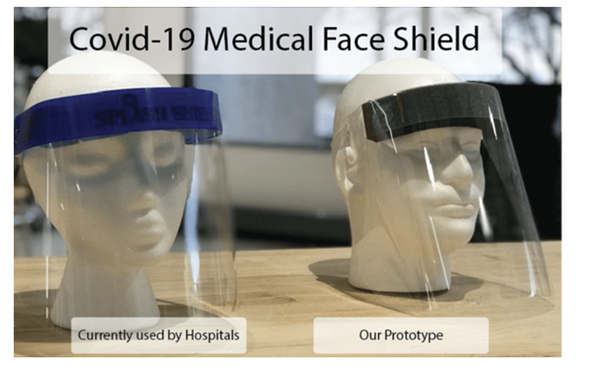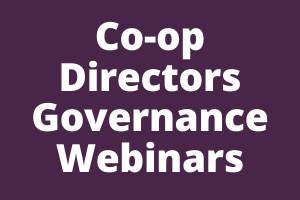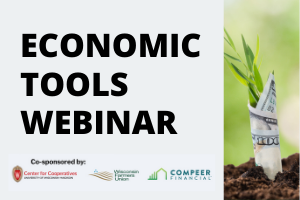|
|

|
|
|
|
Living Our Cooperative Principles
|
|
|
|
|
|
Throughout the pandemic, cooperatives have lived the seven cooperative principles in many ways – hosting elder or immunocompromised shopping hours, donating money and products to local community organizations, providing emergency loans or loan deferrals, etc. Two cooperative principles have been particularly highlighted during this challenging time: Principle 6 – Cooperation among Cooperatives, and Principle 7 – Concern for Community.
Cooperation among Cooperatives
The United States is fortunate to have 14 home care worker cooperatives that provide personal, home, and respite care to seniors and disabled individuals. Just like hospitals, clinics, and nursing homes, home care cooperatives had difficulties accessing personal protective equipment (PPE) to ensure the safety of clients and worker-owners.
|
|
|
|
Several cooperative organizations came together to secure PPE for frontline home care workers. ICA Group, a nonprofit that organizes worker-owned cooperatives in various sectors, partnered with Cooperative Home Care Associates, which provides quality home care to residents in the Bronx, to purchase two thousand masks for the home care cooperative sector nationally. The next challenge – how to
|
|
|
|
get the masks distributed across the country to nine different states? Enter Equal Exchange, a fair-trade worker-
|
Cooperative Home Care Associates members package up masks for national distribution.
|
|
|
|
owned cooperative that distributes organic coffee, chocolate, and tea produced by farmer-owned cooperatives in Latin America, Africa, and Asia. Through a UWCC connection, the three co-ops were able to leverage Equal Exchange’s existing distribution network to store and ship the masks to worker-owners in need.
P7 in Action
When the pandemic hit, Wisconsin worker cooperative Isthmus Engineering and Manufacturing first made sure their worker-owners were safe and able to work from home. They also limited external visitors to their facilities and paid leave to those who could not work or were immunocompromised. After ensuring the safety of their workers, they organized a “P7 Committee” to identify areas in which their technological expertise could specifically help healthcare workers on the frontlines against COVID-19.
|
|
|
|

|
COVID-19 Face Shield developed by Isthmus Engineering & Manufacturing Cooperative.
|
The widespread shortage of PPE left healthcare facilities struggling to protect staff and patients. The Isthmus Engineering team focused their designs to three products: face shields, mask folder technology, and a mask sanitizer. Isthmus Engineering manufactured and donated 4,000 face shields to home care co-ops nationally through the Cooperative Development Foundation and ICA Group. UWCC facilitated initial connections between the organizations. This donation allowed home care co-ops to continue seeing clients.
|
|
|
|
Isthmus Engineering also partnered with the Medical College of Wisconsin to create custom tools to help streamline production of face masks as part of the Milwaukee Million Mask Challenge. They designed a mask folder that can be 3D printed increasing the output of masks tenfold, and provided the design free to communities. Lastly, Isthmus Engineering designed a toaster-sized point-of-use UV sanitizer unit for N95 masks. They made units available to clinics and dentist offices at no cost.
|
|
|
|
At the UW Center for Cooperatives, we often talk about how cooperatives are organized to address an “unmet need.” During the global pandemic, our resilient cooperative ecosystem has shown that cooperatives can work together to meaningfully address the needs of our broader communities.
|
Isthmus Engineering mask folding design increases
|
|
|
|
|
|
New Staff Highlight: Laura Hanson Schlachter
Laura Hanson Schlachter joined the UW Center for Cooperatives at the beginning of the year to co-lead the Cooperative Governance Research Initiative and to manage a survey about co-op diversity, equity, and inclusion efforts. Both projects leverage Laura’s expertise in mixed methods research, survey design, and community economic development policy.
|
|
|
|
Laura’s research and teaching are at the intersection of environmental, economic, and political sociology. She earned her PhD in Sociology and Community & Environmental Sociology at the University of Wisconsin-Madison in 2020 and has published peer-reviewed articles, policy reports, and an undergraduate textbook in addition to directing the Democracy at Work Institute’s 2017 Worker Co-op Census. Her scholarship has received generous support from the National Science Foundation, AmeriCorps, and Rutgers Institute for the Study of Employee Ownership. She also holds a Master in Public Affairs from Princeton University and a B.A. from Whitman College.
|
|
|
|
|
|
CCMA 2021 Goes Virtual
Due to the ongoing pandemic, UW Center for Cooperatives staff and the CCMA National Planning Committee decided to host CCMA 2021 virtually. While it is hard to imagine another year without an in-person gathering, we are excited to create an engaging conference for food cooperators with plenty of opportunities to connect with their cooperative peers. This year's theme, "Reckoning and Renewal" acknowledges how the COVID-19 pandemic has laid bare the flaws that have long existed in our society and how food cooperatives are recalibrating and developing innovative solutions that will ultimately strengthen and enhance our social, economic, and environmental wellbeing.
CCMA 2021 will take place June 7-11, 2021 and will feature the following content:
- Engaging keynote speakers highlighting issues impacting the food cooperative movement.
- Targeted breakout session tracks on operations and governance.
- Facilitated discussions after each webinar where attendees can continue the conversation.
- Virtual co-op road trip exploring food co-ops across the U.S.
- Social activities to connect and network with food cooperative peers.
- Community boards for groups to gather and connect around topics of interest.
- In-app peer to peer networking.
- An online hub with all conference activities in one place.
For more information about the agenda and sponsorship opportunities, please see the CCMA Conference website. Registration will open in April 2021!
|
|
|
|
|
|
|
In Brief: Updates and Resources
|
|
|
|
UWCC Advisory Committee Updates
UWCC is pleased to welcome Mike Wade, President and CEO of Central Wisconsin Electric Cooperative (CWEC), to the UWCC Advisory Committee. CWEC serves 8,000 consumer-members in Portage, Marathon, Shawano, and Waupaca counties and is headquartered in Rosholt, WI.
We also want to thank Keith Heikes for his many years of service on the UWCC Advisory Committee. Heikes will retire as Chief Operation Officer of URUS at the end of May after decades of service to agriculture cooperatives including Genex Cooperative and Cooperative Resources International.
|
|
|
|
New Training Available for Agricultural Cooperative Directors
- 23 modules covering topics on governance, strategy, cooperative accounting and finance, and cooperative principles & values.
- An accompanying downloadable workbook featuring learning objectives, skills-building exercises & reflection activities. (Hardcopy available for purchase.)
- Optional quizzes & assessments for directors to demonstrate skills-building.
- Downloads and links to other resources for further study.
- Optional monthly "office hours" for enrolled directors to pose questions, join in-depth discussions, and learn from faculty and peer directors.
Tailored cooperative training is critical to developing a productive and forward-thinking board, increasing productivity of the cooperative, and ensuring a positive relationship between the board and management. For more information about the training please see the Foundations website.
|
|
|
|
UWCC Interview with 40 Acre Cooperative
UWCC has partnered with Midwest Organic & Sustainable Education Services (MOSES), to explore innovative agricultural cooperatives for MOSES' Organic Farming Podcast. For the first session, UWCC Cooperative Development Specialist, Kelly Maynard, interviewed Angela Dawson and Kheph Rakhu of 40 Acre Cooperative. 40 Acre Cooperative is the first national black farmer co-op since the reconstruction era in the Unites States. Their mission is to promote agricultural development and economic equality for socially disadvantaged farmers. The interview is structured around the seven cooperative principles:
Cooperative Solutions for Local Meat Processing
Local meat processing is crucial for family farms who sell processed meat directly to consumers or through food co-ops and other retail venues. This allows farmers to set their own price rather than having to sell animals through unpredictable conventional markets; it’s an important pathway to ensuring a future for family farms in Wisconsin. Wisconsin Farmers Union developed the "Winter MEAT-ing" webinar series after hearing rising concerns from farmers about meat processing capacity challenges statewide. UWCC Cooperative Development Specialist Kelly Maynard presented on the Creative Cooperative & Community Solutions webinar to highlight how the cooperative model can benefit local farmers and meat processors.
|
|
|
|
|
|
|
|
|
|

|
Co-op Directors Governance Webinars
April 13, 2021, 10:30 - 11:30 a.m. CT
May 4, 2021, 10:30 - 11:30 a.m. CT
This spring, the UW Center for Cooperatives will host two webinars on the following topics: Cooperative Board Self Evaluation and Effective Decision Making in the Board Room. Directors from all sectors and types of cooperatives are encouraged to attend.
There is no cost to attend this event.
|
|
|

|
Economic Tools Webinar
March 30, 12:00 -1:15 p.m. CT
This workshop will focus on three different economic development tools: crowdfunding, rural TIF districts, and the Industrial Revenue Bond program, that could be used by rural towns or villages to help establish or expand processing facilities for ag products such as meat, dairy, or other products.
There is no cost to attend this event.
|
|
|
|
|
|
|